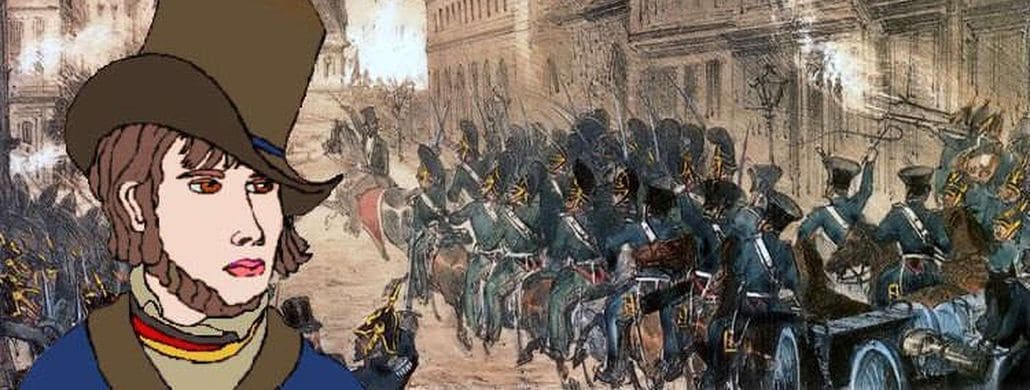
[America and Germany, 1848/49] Good news come from Germany: the March revolution, a country united and the National Assembly. But eventually, revolution fails, and Lorenz Bergmann must flee.
Revolution 1848/49 in Germany
In May 1848, one saw a new decoration at the Merry Dragon Inn. Next to the American flag there was a black, red and golden one. Beaming with joy, Niklas shared the news from Germany, “This is the new national flag! Our old homeland is finally united, and for the first time our people can freely elect a Parliament! And would you believe who is an MP? Jacob Grimm!”
The great social need and pent-up anger against the restoration policy had finally erupted in the March revolution. Caught by surprise and off guard, the rulers of the small and medium German states had given in to the “demands of March” and appointed liberal ministers, the “March ministers”. The Federal Council had released censorship of the press and declared black-red-golden as the national flag. For the first time there had been free elections for a National Assembly for all of Germany*, and the march of the parliamentarians, among them Jakob Grimm, into St. Paul’s Church in Frankfurt on May 18, 1848, had been a happy day. Everywhere people had waved black-red-golden flags and cheered for the parliamentarians.
Democratic ideals
Niklas felt an overwhelming joy and happiness. So many years he had told the children coming to the “Merry Dragon” about the Brothers Grimm, how in 1837 the Prussian authorities had prosecuted them for standing up for what was right. He had read their fairy tales with them. Now Jacob Grimm was a Member of the National Assembly, and to Niklas it was a dream come true. His family in Germany wrote all the exciting news.
“Wish you were here! From all over our country, people come to vote for the National Assembly. Our King Friedrich Wilhelm IV has appointed Ludolf Camphausen from Cologne as his Prime Minister, imagine, a citizen from the Rhine Province at the top of the Prussian king’s government! Along with him in the cabinet is David Hansemann of Aachen, both are industrialists with a big fortune, so it is not a bad deal for the Prussian crown.
Premier Camphausen from Cologne
Camphausen is a liberal, and it is very difficult for him to accomplish anything against the camarilla at the Court, staunch conservatives, even reactionaries. On the other side, we are democrats, and we want so much more than he does. The Liberals around Camphausen are ready to compromise for a constitutional monarchy, and speak against general and equal suffrage. We democrats want a republic and the right to vote for everyone*. And we want a constitution like yours in the USA! We want all our people represented in parliament, not only liberal member of the educated and propertied classes, but also by craftsmen, traders and small farmers!
Kinkel and Schurz
You should see what is going on in Bonn. University professor Kinkel is leading the Democrat, by his side his young student Carl Schurz. They publish a democratic newspaper, the “Bonner Zeitung”. And more than that, Kinkel has founded an association for further education of craftsmen. Of course Hubert has immediately volunteered. You have known him for years, education for all is a matter most dear to his heart. Many here can barely read and write, so they cannot understand complex political issues and deliberately make their decisions yet. All these years as a teacher, he has seen how difficult it was for many families to send their children to school at all, and how many children have come with an empty stomach! His wife Henriette and his daughter Anni have always prepared food for them.
Lorenz
At Hubert’s side is his young nephew Lorenz, he was born after you left. He grew up with your letters and drawings, and now he knows everything about the uncles in America and the “Land of the Free”, where the people elect their president. And of course Hubert’s grandchildren Sophie and Hans are on it, they are only kids, but they say it doesn’t count, they can help kids of the craftsmen and peasants with their homework. They all grew up with your stories and drawings from America!”
Niklas’ thoughts went out to his German family and friends. How excited they must be, through the words he could sense their excitement, their hope, their joy. That was what he had hoped for, what Hubert and his family had worked for so many years.
Revolution fails
But while the National Assembly was discussing a new constitution, it was overtaken by reality. There was no unity even among the democrats. The Bonn democrats did not agree with another, more radical faction around Karl Marx, whose paper “Neue Rheinische Zeitung” began talking of class struggle. Marx’ Communist Manifesto had just been published.
The fights continued and in November/December government troops crushed the revolutionary movements, in Vienna and Berlin the old powers regained control. When in April 1849 the National Assembly finally adopted a Constitution and offered the crown to King Frederick William IV of Prussia, it was far too late. The king refused, the National Assembly was forced to dissolve.
A second revolutionary wave went through Germany, mainly Saxony, Baden, the Rhineland, Westphalia and the Palatine – democrats took up arms again to force the monarchs to accept the constitution. Prussian troops under Prince Wilhelm were marching against them.
Lorenz must flee
When the news came to America, the Bergmann brothers got worried. A couple of weeks later, they received an urgent letter from their cousin in the Rhineland. Lorenz had to flee and was on his way via England to North America to them. From London, he could barely cable the name of the ship that would take him to New York.
“You will know from the newspapers about the revolution, the National Assembly, and its failure. It is so terribly disappointing, outraging, and you feel so helpless with all these Prussian soldiers in Bonn, Cologne and Coblenz. In the night of May 10/11, 1849, Kinkel and Schurz marched at the top of 120 citizens to the arsenal in Siegburg, to get the Landwehr’s (militia, home guard) weapons stored there. Lorenz was with them. But the operation failed, the soldiers crushed it. Lorenz was spotted by the Prussian police and was prosecuted. Jean’s family had helped him escape on his Rhine steamer to Strasbourg in France.”
The Bergmann brothers were devastated. Their hopes for a united, democratic Germany had all gone, Lorenz and many others had to fear for their lives and flee. And more than that, the victory of the reaction would have severe consequences: now the Prussian authorities would strictly censured the press and forbid assemblies. Democrats would have to fear house search, spying, confiscation, even harassment by the police and arrest.
* yet, men only
German Revolution 1848 fails | Read more
Wikipedia, Revolutions of 1848/49

Be the first to comment